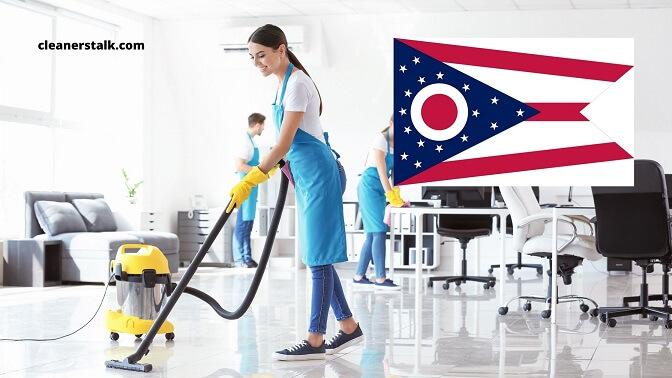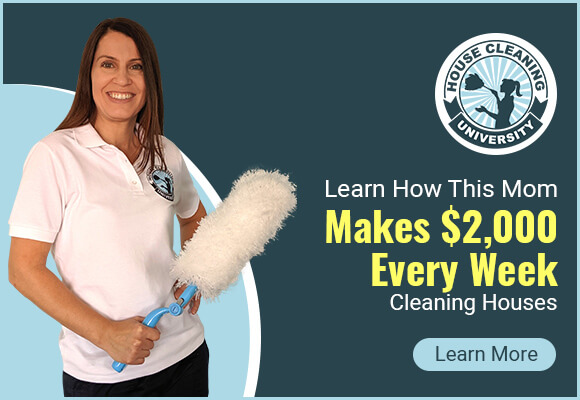
How to Start a Cleaning Business in Ohio Guide
The information contained in this article is provided for information purposes only, not intended as legal and/or financial advice.
Why start a cleaning business in Ohio?
With close to 12 million people and an average annual income of $56,483 (according to Statista), Ohio is a lucrative place to consider starting your own cleaning business. In fact, the economic forecasts are very healthy for Ohio and it is growing at a faster pace than the U.S. average.
In terms of employment sectors, the top industries employing Ohio residents are automotive, steel, agriculture, small appliances, and aerospace. Professional sports teams such as the Cleveland Indians, Cavaliers, and Cincinnati Bengals have been a huge contributor to the financial success of the state.
With such a stable residential base and a high average household income, house cleaning is a big opportunity in Ohio. There are 317 towns and cities in the state. You can start your cleaning business in Columbus, Cleveland, Bellbrook, Dayton, Cincinnati, Mason, West Chester, and many smaller towns and cities.
If this is your first attempt at creating a successful cleaning business, having a blueprint can help you avoid mistakes that can slow down your success. We highly recommend this course by House Cleaning University. The founder is able to help you make up to $2,000 per week while continuing to grow month after month.
Starting a cleaning business in Ohio (Columbus, Cincinnati, or Cleveland)
This guide on how to start a cleaning business in Ohio is broken down into 11 simple steps. By the end, you should have an idea on how to execute the plan. Here are the steps to starting a cleaning business in Ohio:
1. Create a business plan (blueprint)
Your first step is to create a business plan. Unless you are seeking funds from an investor, you do not need lengthy pages. Instead, it’s best to keep it simple. What you need is a vision for where you want your business to go, and how you can make it happen. The blueprint may change over time, and that’s okay.
During this phase, try to focus on your local competition in Ohio and figure out how you can differentiate your cleaning business. Evaluate your competition and ask yourself the following questions:
- Which competitors in Ohio match your business the closest?
- What are the strengths of your competitors?
- How much are their rates and pricing?
- What are the main weaknesses of your competitors?
- How do they advertise? Are they on social media platforms?
- What is unique about your competitors?
Read testimonials and customer reviews to find out what their customers like most. Make a list of all this information and compare it with your own business. Give your business an honest evaluation. After you’ve taken some time to evaluate, ask yourself the following questions:
- How will you offer more value than your competitors?
- What unique qualities do you see in your business that your competition lacks?
- What can you deliver to your customers that your competition cannot?
- What offers and promotions will you have?
Write the answers down. These open-ended questions will help you formulate an business description so you can create a strong brand of cleaning business that stands out among the others in Ohio.
2. Name your cleaning business
The name of your cleaning business should be simple and not complicated. Choose a name that rolls off the tongue and is easy to remember. A business name that’s short and direct is often the best.
Just be sure to do an online search for names similar to the one you’re planning to use. Start with a statewide corporate business name search in Ohio to avoid legal problems and customer confusion or call the Business Services Division (877) 767-3453. Search beyond the first page of results too.
3. Choose a business structure
A business structure is an organization that does business. The type of business structure you choose determines your cleaning business liability and how it will be taxed in Ohio. Different laws apply to different entities. Let’s look at some of your options as a small cleaning business start-up:
- Sole proprietorship - A sole proprietorship is the simplest and most common structure chosen to start a business. It is an unincorporated business owned and run by one individual with no distinction between the business and you, the owner. You are entitled to all profits and are responsible for all your business’s debts, losses, and liabilities.
- Doing Business As (DBA) - DBA stands for “doing business as.” It’s also referred to as your business’s assumed, trade or fictitious name. Filing for a DBA allows you to conduct business under a name other than your own; your DBA is different from your name as the business owner, or your business's legal, registered name.
- Partnership - You can form a partnership by going into business with someone else. A General Partnership has no additional filing requirements. This type of partnership is identical to a sole proprietorship in terms of liability and tax purposes. The downfall would be that one partner may find themselves personally on the hook for the other partner’s actions or abuse.
- Limited Liability Company (LLC) - A limited liability company (LLC) is a business structure in the U.S. that protects its owners from personal responsibility for its debts or liabilities. Limited liability companies are hybrid entities that combine the characteristics of a corporation with those of a partnership or sole proprietorship.
If you’re not sure about choosing your business structure, we recommend going through the House Cleaning University course. Inside, they will teach you how to get things up and running in less than 7 days. Once you’re set up, you’re ready to make $2,000 per week cleaning houses in Ohio.
4. Set your cleaning rates and pricing
Once you’ve chosen a business structure, you need to set your rates and pricing. The smartest way to get a grip on how much you should charge is calling all the residential cleaning companies in Ohio (Columbus, Cincinnati, or Cleveland) for price quotes and see what your competitors are charging.
After getting 8 to 10 different cleaning quotes, you should have an idea of the average house cleaning rate in that area. To get a headstart, you can price yourself slightly lower than the franchises and somewhat higher than the individuals offering cleaning services. This pricing strategy works great.
5. Choose your cleaning service area in Ohio
Driving to customer homes that are far away from each other is a huge time-suck. Remember, time is money. You can spend less time driving and clean more houses if your clients live close to each other.
The key is to concentrate on a smaller service area. For example, if you are starting a cleaning business in Columbus, Ohio, focus on advertising your services to one neighborhood first. Avoid stretching yourself too thin to dominate a smaller service area through repeated advertising and establish brand awareness.
The more people see your brand, the more recognizable and memorable your business will become. By doing this, your business will become the go-to residential cleaning company for your chosen service area in Ohio.
6. Open a small business bank account
This step is straightforward. Open a small business bank account for your cleaning business. You’ll want to keep your personal account separate from your business account, so take a trip to your nearest Ohio bank and have them open a new bank account for your small residential cleaning business.
7. Set up insurance
As part of a cleaning business startup costs, insurance is one of the most important things. At a minimum, you’ll want to purchase general liability insurance. This insurance will cover bodily and property damage.
Additionally, you may need a janitorial bond (surety bond) to protect the homeowner’s assets in the event of a theft. If you have employees, you’ll need workers’ compensation insurance. This insurance provides payments for medical bills, rehab costs, and lost wages for employees who get injured on the job.
8. Obtain the necessary forms
To keep your business organized, you will need to get a few business forms before officially starting your residential cleaning business. Don’t skip this step, as most new cleaning business owners suffer chaos behind the scenes without forms. Here are some examples of the necessary forms to get:
- Breakage report
- Cleaning invoice forms
- Cleaning service agreement
- Cleaning service checklist
- Contractor/employee non-compete agreement
- Customer referral form
- Quote estimate form
- Satisfaction survey
You can get all of the above forms and much more in the House Cleaning University course. All you have to do is to add the name of your house cleaning business, logo, and contact information on it.
9. Purchase cleaning equipment and supplies
You cannot start a cleaning business without cleaning equipment and supplies. We won’t be mentioning each item right here, but if you are interested, here’s the complete list of things needed to start a cleaning business.
10. Prepare marketing tools
Marketing is the key to land your first batch of clients for your new cleaning business. Contrary to popular belief, there are plenty of free advertising methods you can use for your cleaning business. Set up your website and social media accounts to establish your presence online. Tell your friends and family too.
Landing your first 10 clients is the tricky part. We highly recommend this course by House Cleaning University. The founder is able to help you make up to $2,000 per week while continuing to grow month after month.
11. Get customers and organize your schedule
As you get busy and start booking more cleanings, you’ll find it harder to manage your schedule and stay organized, especially if you’re using a physical planner book or calendar. We recommend setting up a Google Calendar right from the beginning. It’s free to use and makes scheduling and organizing more manageable.
Ready to start your cleaning business in Ohio?
Today, more than ever, people are pressed for time. With both spouses working, people don’t have the time to clean anymore. What was once considered a luxury service is now considered a necessity service.
And considering there are 12 million people with an average annual income of $56,000, Ohio is a great place to start your cleaning business. You can start in Columbus, Cincinnati, or Cleveland.
However, trying to start your own cleaning business without the help of someone who has already done it is like going through water without a paddle in a barbed wire canoe (it’s a recipe for disaster).
If you are serious about starting your own cleaning business in Ohio, we recommend the House Cleaning course. Inside, they will teach you how to land your first 10 clients and earn upwards of $2,000 per week with continuous growth. By learning from an industry expert, you’ll avoid any potential pitfalls.
Related articles:

